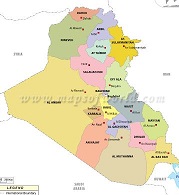Summary
Context
Iraq, particularly the Kurdistan Region of Iraq (KR-I), has become host to a significant population of refugees after decades of regional and domestic conflict, compounded by the activities of the the group known as Islamic State of Iraq and the Levant (ISIL), the Syrian civil war, and political turbulence in countries like Iran, Turkey, and Yemen, giving rise to a regional refugee crisis.1 In the absence of proper work contracts, social protection norms, and defined labour regulations for refugees, a high proportion of refugee households operate in the informal sector.2 Informal workers in Iraq comprise 52% of the total workforce, the majority of whom are daily-wage workers.3 This segment of the workforce is particularly vulnerable to the economic and labour market shocks as the impact of the pandemic continues to be felt across Iraq.
The COVID-19 pandemic has adversly impacted the Iraqi economy at a time when it was already fragile due to prolonged and protracted instability in the region and a fall in oil prices.4 For refugee households engaging in daily-wage work, especially, COVID-19 and its related developments such as lockdowns, movement restrictions, and other mitigation measures, have greatly affected livelihood and employment opportunities. Research to assess the impact of COVID-19 on daily-wage work and particularly on refugee households that rely on it is, however, limited. As such, IMPACT Initiatives (IMPACT) conducted a qualitative assessment, funded by the United Nations High Commissioner for Refugees (UNHCR), aimed at better understanding whether, and to what extent, daily-wage work and the socio-economic conditions of refugee households that rely on income from daily-wage work have been impacted since the COVID-19 pandemic started in KR-I in March 2020.
Assessment
In line with UNHCR’s strategic objectives towards durable solutions for conflict-affected populations, especially those in protracted displacement, this study aims to provide insight into how refugee households that rely on income from daily-wage work have been affected by and are adapting to the economic changes, if any, in their situation since the start of the COVID19 pandemic. Furthermore, it aims to develop an understanding of how the impact of the pandemic varies based on gender, and across the three governorates of KR-I: Al-Sulaymaniyah, Duhok and Erbil. Finally, the key findings from the study aim to inform appropriate responses that can be provided to support the affected households.
IMPACT utilised a semi-structured data collection approach using qualitative research methodologies alongside a secondary data review (SDR) to conduct 73 household-level Key Informant Interviews (KIIs)5 with 53 male and 20 female respondents from out-of-camp refugee households across KR-I that rely on income through daily-wage work. Data collection, in the form of household-level KIIs, was conducted remotely through IMPACT’s Erbil- and Duhok-based call centres between 16 and 23 December 2020. A primary list of contacts for these KIs was compiled using UNHCR’s refugee database and IMPACT networks. A short selection interview, prior to the main KIIs, was conducted by the IMPACT team between 15 and 17 December 2020 to determine the eligibility of participants for the study. All responses were recorded using KoBo toolbox. The data from these KIIs was then analysed using thematic content analysis using IMPACT’s Data Saturation and Analysis Grid in Microsoft Excel. Due to the qualitative nature of the research, findings from this assessment are indicative only.6
To continue reading download PDF document
IMPACT_UNHCR_Report_Impact of COVID-19 on Daily-wage Work_v2
Source: Reliefweb, 13 April, 2021







Comment here